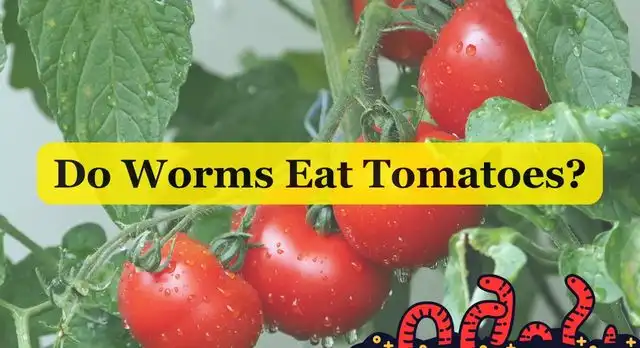Do Worms Eat Tomatoes? The Juicy Truth
Tomatoes are a popular and versatile fruit enjoyed by many people around the world. But have you ever wondered if worms share the same fondness for these juicy delights? In this article, we will explore the eating habits of worms and uncover the truth about whether worms eat tomatoes. Prepare to discover the fascinating world of these underground creatures and their relationship with this beloved fruit.

Do Worms Eat Tomatoes?
Yes, worms can eat tomatoes, but their preference for tomatoes may vary depending on the species and the conditions they are in. While tomatoes are not a natural part of their diet, worms can consume them when they are present in their environment.
What Attracts Worms to Tomatoes?
While worms may not actively seek out tomatoes as their preferred food source, several factors can attract them to these fruits. These factors include:
Ripe or Overripe Tomatoes: Worms are more likely to consume tomatoes that are ripe or overripe. As tomatoes ripen, they release ethylene gas, which signals to worms that the fruit is ready for consumption.
Damaged or Decaying Tomatoes: Worms are particularly attracted to damaged or decaying tomatoes. When tomatoes start to rot or have soft spots, they become more easily accessible to worms, making them an enticing food source.
Presence of Other Organic Matter: If tomatoes are present alongside other decomposing organic matter, such as vegetable scraps or fallen leaves, worms may consume them as part of their overall diet.
Worms and Tomato Plants
While worms may eat tomatoes when they have the opportunity, it’s important to note that they do not typically feed on healthy tomato plants or their foliage. The focus of their feeding activity is usually on decomposing organic matter rather than live plant material.
However, worms indirectly benefit tomato plants through their role in improving soil health. As worms consume organic matter and create tunnels in the soil, they enhance soil aeration, water retention, and nutrient availability. These factors contribute to healthier tomato plants with improved growth and yield.
Considerations for Feeding Worms Tomatoes
If you want to feed tomatoes to worms in a controlled environment, such as a vermicomposting system, there are a few considerations to keep in mind:
Moderation: It’s important to feed tomatoes to worms in moderation. Tomatoes are relatively high in acidity, and an excessive amount may disrupt the balance of the vermicomposting system.
Cut or Crushed Tomatoes: To facilitate easier consumption, it’s beneficial to cut or crush tomatoes before adding them to the vermicomposting system. Smaller pieces provide more surface area for worms to feed on and expedite the decomposition process.
Balanced Diet: Worms require a balanced diet to thrive. It’s essential to provide a variety of organic materials alongside tomatoes, such as vegetable scraps, shredded paper, or dry leaves, to ensure their nutritional needs are met.
Conclusion
In conclusion, while worms may not actively seek out tomatoes, they can consume them under certain conditions. Ripe or overripe tomatoes, damaged or decaying tomatoes, and the presence of other organic matter can attract worms to these fruits. However, it’s important to remember that worms primarily feed on decomposing organic matter rather than live plant material. Incorporating worms into vermicomposting systems can be a sustainable way to process tomato scraps and other organic waste while benefiting soil health.
Key Takeaway
Worms have the ability to eat tomatoes, particularly when the fruits are ripe, damaged, or decaying. However, their preference lies in decomposing organic matter rather than fresh plant material. By understanding the relationship between worms and tomatoes, we can appreciate the role these fascinating creatures play in the natural cycle of nutrient recycling and sustainable waste management.
Related Guide
Do Worms Eat Ants? Relationship Between Worms and Ants
FAQs
What worms like tomatoes?
Worms, such as red wigglers, typically don’t have a strong preference for fresh tomatoes. They are more inclined to consume decomposing organic matter like vegetable scraps, leaves, and grass clippings. While worms may nibble on soft or overripe tomatoes, it is not their preferred food.
Can you put tomatoes in compost for worms?
Yes, tomatoes can be added to compost for worms. However, they might take longer to break down compared to other compostable materials. It is recommended to chop or blend the tomatoes into smaller pieces to make it easier for worms to consume them. Mixing tomatoes with other organic materials like vegetable scraps, coffee grounds, or shredded paper can help create a balanced compost diet for worms.
Can worms eat rotten tomatoes?
Certainly! Worms can eat rotten tomatoes. Rotten tomatoes have already begun to decompose, making them more appealing to worms. The soft texture and increased nutrient availability in rotten tomatoes make them suitable as a food source for worms. It’s important to avoid adding tomatoes treated with pesticides or those that contain mold or fungal growth, as these can be harmful to worms.
